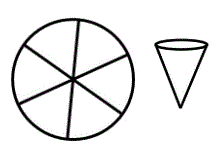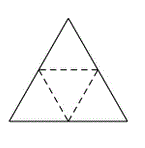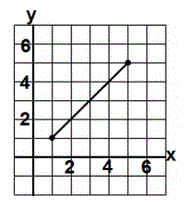| Problem |
Hint |
 3) Six paper cones for cotton candy are created from a
circle with radius 6 inches by cutting out pie shaped
pieces that each are one sixth of the circle and then
taping together their edges. What is the radius of the
circular rim of one of the cones if there is no
overlapping when the edges are taped?
3) Six paper cones for cotton candy are created from a
circle with radius 6 inches by cutting out pie shaped
pieces that each are one sixth of the circle and then
taping together their edges. What is the radius of the
circular rim of one of the cones if there is no
overlapping when the edges are taped?
(Drawing not to
scale.) |
1. Compute the circumference of the circle:
C = _______
2. Divide that by 6 = ______.
This is the circumference of the base of the cone
3. Compute the radius of the base of the cone, given this circumference: R = _____
|
 4) A regular tetrahedron can be formed from an equilateral triangle by folding along the dotted lines as shown in the figure. Maria is
experimenting. The first tetrahedron she folds looks too small to her. She scales it up by doubling the edge lengths. What is the ratio of the surface area of the bigger tetrahedron to the original tetrahedron?
4) A regular tetrahedron can be formed from an equilateral triangle by folding along the dotted lines as shown in the figure. Maria is
experimenting. The first tetrahedron she folds looks too small to her. She scales it up by doubling the edge lengths. What is the ratio of the surface area of the bigger tetrahedron to the original tetrahedron? |
The fact that the equilateral triangle can be folded into a tetrahedron is irrelevant to this problem! Also, the fact that the triangle is equilateral is irrelevant, too!
1. Here is the area of the original triangle :
A = (B H) / 2
2. Write the the equation for the area of a triangle whose base and height are twice as big:
Abig = _______________
3. Divide this by the original triangle area:
4. Ratio = __________
|
 5) The base of an isosceles triangle has vertices at (1,1) and (5,5) as shown. Its height is 3/4 the length of its base. What can the
coordinates of its vertex be?
5) The base of an isosceles triangle has vertices at (1,1) and (5,5) as shown. Its height is 3/4 the length of its base. What can the
coordinates of its vertex be?
|
Solve by inspection:
1. Calling the length of one little 1x1 square diagonals D, the length of the base is ____ x D.
2. 3/4ths of this is _____ diagonals D
3. Find the midpoint of the base: = (___,___)
4. From this point move perpendicular to the base, both right and left from the base the above number of diagonals to get the 2 points.
Put a dot on each of these 2 points.
5. These 2 points are (___,___) and (___,___).
|